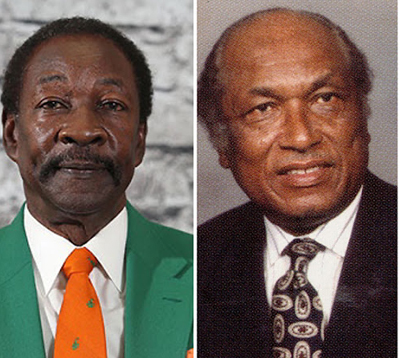By Keith Miles
Florida A&M University (FAMU) mourns the loss of historian and former dean Leedell Neyland, Ph.D., and former director of athletics Ken Riley, who both passed last weekend.
“It was a tough weekend for Rattlers,” said President Larry Robinson, Ph.D. “In Dr. Neyland and Ken Riley, the University has lost two outstanding sons, who both exemplified FAMU’s motto, “Excellence with Caring” throughout their lives,” Robinson added.
Neyland, a World War II veteran, former dean of the College of Arts and Sciences and retired provost and professor emeritus, is credited with compiling and chronicling the university’s history in “Florida Agricultural and Mechanical University: A Centennial History (1887-1987).”
Robinson added, “Dr. Neyland was a highly regarded historian, administrator and community servant.”
Neyland also co-authored with former School of Business and Industry associate professor Annette Singleton Jackson the book, “The Florida A&M University School of Business and Industry: SBI, The Sybil Collins Mobley Years.”
He was living in Las Vegas and was 98 years old.
Former Director of Athletics Ken Riley was a four-year starting quarterback for legendary FAMU head coach Alonzo “Jake” Gaither and a Rhodes Scholar nominee. He went on to be selected in the sixth round as the 135th pick by the Cincinnati Bengals during the 1969 NFL Draft where he played for 15 years (1969-1983) as a defensive back. Riley recorded 65 interceptions in his career, which was the fourth-most in NFL history at the time of his retirement and is currently fifth on that list.
While he is fifth on the NFL All-Time interceptions list, he remains the only player in the top five not enshrined in the NFL Hall of Fame.
“Riley was an outstanding student at FAMU and decided not to apply for the Rhodes Scholarship after he was drafted by the NFL. He was a great person as well.”
In 1986, Riley took over the head coaching duties at his alma mater, Florida A&M. While at FAMU from 1986-93, Riley compiled a 48-39-2 record, with two Mid-Eastern Athletic Conference (MEAC) championships and a pair of MEAC Coach of the Year honors.
Riley, who was inducted into the FAMU Athletics Hall of Fame in 1977, served as the Florida A&M athletics director from 1993-2004, before retiring in Bartow, Fla.
He died in Bartow early Sunday morning at the age of 72.

